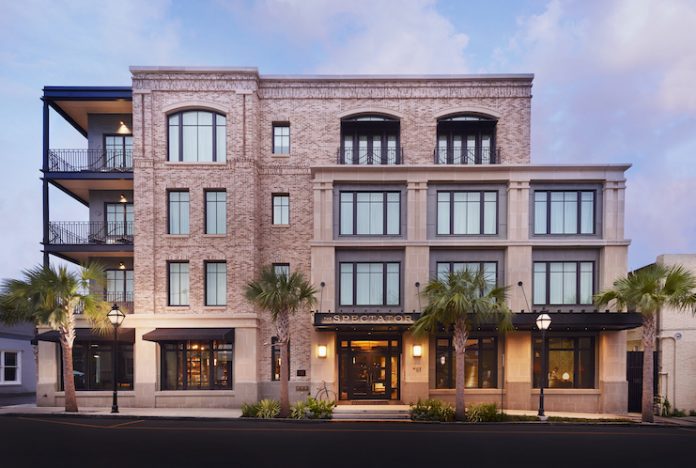Charlestowne Hotels has faced a lot of changes since beginning as owner/operators of mainly branded hotels in the Charleston, South Carolina, area. Now butting up against the big 4-0 after a year that seemed like a decade, Chief Operating Officer Kyle Hughey and Revenue Vice President Johnathan Capps described for LODGING how it was their “core flexibility” that has guided their growing management company, mentioning, too, how the pandemic hasn’t much changed their growth goals or their journey to achieving them.
In what ways has Charlestowne changed since its founding nearly 40 years ago?
Hughey: We started basically in the Charlestowne market as owner/operators of branded properties, but after a decade or so, we morphed into a third-party management company. It was our core attribute of agility that has enabled us to change directions when we believed the situation merited it. This started with managing unbranded smaller independent properties, then we began to branch into niche segments such as the university market.
Capps: It helped that we developed a reputation for executing well on the projects we took on and that, seeing how independent properties were growing in other markets, lenders were becoming more flexible about funding such “passion projects.” We also recognized the growth opportunity of taking successful niche models regionally, showing they could perform well in the Northeast or on the West Coast. We developed expertise in creating properties with the independent spirit of the historic inns people loved and found the right people to staff and manage them.
What are Charlestowne’s biggest priorities for the coming years? Were they at all impacted by the pandemic?
Hughey: Again, we had already begun growing beyond our Charleston base, beginning with the Northeast and the Colorado mountain area. Our objective now is to parlay this growth into synergy and cost efficiency that build and allow the owners to benefit. We’d like to continue that geographic expansion over the next few years, to establish a cornerstone on which to build.
Capps: An added benefit of having a presence in these areas vastly increases the number of owner-to-owner leads and even offers the opportunity for a potential owner to see the properties we manage. As for the impact of the pandemic, it’s unfortunate that the downturn has forced some owners into receivership or sales, but there are opportunities for a management company like ours, so we are keeping an eye on these transactions, as well as the partnerships being formed. As VP of revenue, it’s my job to chase that revenue as demand is seeming to come back strong in some markets. For us, that also means re-staffing to maintain our reputation for providing a high-level experience at the properties we manage.
In what ways has your company adapted to a changing industry environment?
Capps: We are constantly examining our structure and our ability to support it. We may engage a corporate recruiter to help us hire the new people we need so our human resource manager can focus on culture and retention and our general managers can focus on service and housekeeping. We must be staffed not only for the environment we’re in now—after a tough 12 months for the industry—but for the future, to figure how to add five properties to the portfolio without overburdening the staff.
Hughey: The kind of trust that is part of building relationships and working with clients whose valuable assets we manage has been especially important at a time when many questioned whether they should even be in the business and whether their assets could survive. It was important for me to affirm those relationships, build them, and give clients confidence in us and our competence.
Were there any takeaways learned from the difficult past year that you plan to take into the future?
Hughey: It was a tough year, but it did give us a good reset. We were talking to our owners and our clients more than ever; where we used to check in monthly or even quarterly, for a while, we were connecting and communicating almost weekly—sharing what we saw in the market and industry, helping them with PPP, etc. We realized this level of communication and collaboration with the owner is what we should be doing all the time. We also had a renewed appreciation of our guests’ value—even when there were so few—and the need to make them feel special.
Capps: I felt that level of communication instilled a sense of pride in being part of the company, not just here in the corporate office, but across all our hotels. We felt the agility we mentioned as being part of our core enabled us to take on this challenge in that it allowed some of our properties to stay open or keep one extra staff member employed. In general, I think, along with retaining trust and our nimbleness, we fared well because of the types of properties we have and that we didn’t over-react.
What’s your outlook for the industry and for Charlestowne in the year ahead?
Hughey: I think things are coming back quickly. Most of our properties are in the leisure market, where there’s a lot of pent-up demand for travel. We had a relatively nice first quarter and it looks like Q2 will outperform our forecast.
Capps: Based on vaccine roll out and public comfort with travel, we expect markets with outdoor attractions that don’t depend on corporate meetings to bounce back first, but that there will be somewhat scaled-down meetings and events for a while. But, as we go along through the summer and into early 2022, we expect momentum to build.











